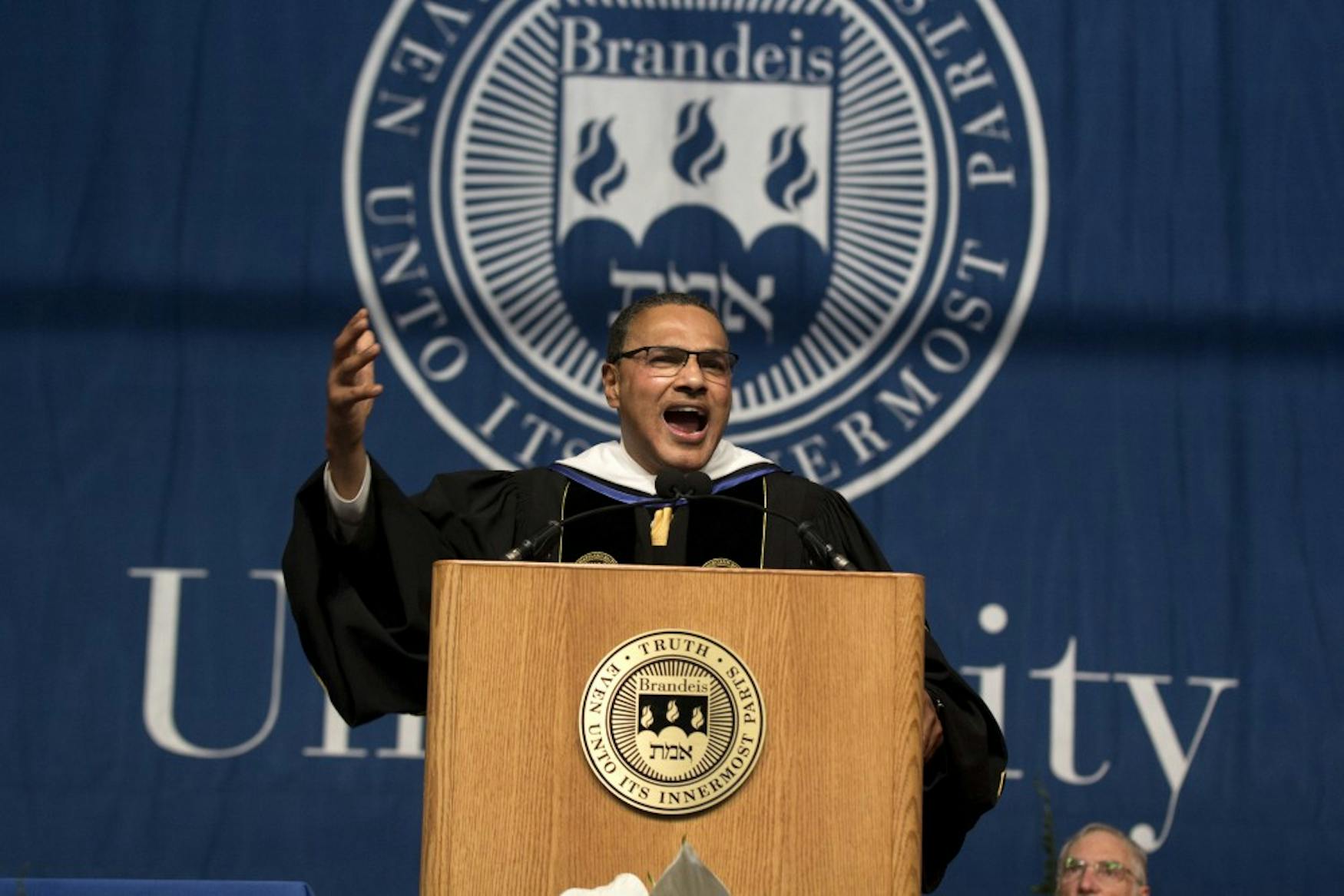Hrabowski urges grads to stand up for justice
“Each of us is a collection of stories,” Dr. Freeman A. Hrabowski III told the Class of 2018 during his address for the University’s 67th commencement. Hrabowski’s speech was shaped by and grounded in stories from his mother’s life as well as his own. The address explored the importance of justice, truth and a strong sense of self to improving the world.
Hrabowski has lived a life of determined activism, pursuing the values his speech proclaimed. In 1963, 12-year-old Hrabowski became a freedom fighter when he marched in the Children’s Crusade for civil rights in Birmingham, Alabama. He went on to become the president of the University of Maryland, Baltimore County, where he continues to improve minority access, participation and performance in higher education, especially in science, technology, engineering and math.
The ceremony took place on Mother’s Day, so Hrabowski highlighted his mother’s life as a teacher and civil rights activist in his speech. In 1948, the same year that Brandeis was founded, his mother led a protest against the disparity between Black and white teachers’ wages and was consequently fired. Luckily, she was hired by another school district just days later. “She stood up for justice,” Hrabowski said.
Hrabowski also drew lessons from his own life, centering on the moment in his youth when he was jailed for participating in the Children’s Crusade. He recounted his struggle to understand his identity after being treated brutally in jail. “I had to be taught that I was not an animal, that I could not allow other people to define who I am,” he said, adding, “Don’t you ever allow anyone to define who you are.”
While in jail, Hrabowski was visited by the Reverend Dr. Martin Luther King, Jr., who told him and the other imprisoned children, “What you do this day as children will have an impact on young people who have not yet been born.”
This idea of making an impact beyond oneself was prevalent throughout Hrabowski’s speech as he challenged graduates to never stop learning and pursuing the truth. Highlighting the importance of paying attention to one’s internal self, Hrabowski told graduates, “I challenge you to watch your thoughts, they become your words; watch your words, they become your actions; watch your actions, they become your habits; watch your habits, they become your character; watch your character, it becomes your destiny, dreams and values.”
University President Ron Liebowitz spoke to the graduates about the future significance of their Brandeis education. He noted that “unlike other speakers, I do not stand here to share advice. But I do want to leave you with a thought and a hope of mine. … Brandeis is not an impersonal thing. It’s not an object. It is people.”
Before praising the “talent and accomplishments” of the Class of 2018, Liebowitz called for a moment of silence for the two members of the Class of 2018 who took their own lives. “Their absence is like a hole in our heart,” he said.
Liebowitz also highlighted the diverse accomplishments of the Class of 2018, including scientific research, global health advocacy, entrepreneurship and achievement in the arts. He expressed his belief in the graduating class, saying that “even the most cynical among us would feel hope for the future.”
While Liebowitz focused on graduates’ bright futures, during his student address William Jones ’18 focused on “the students who struggled” in the last four years.
“This speech is written for first generation students; for students with vouchers; for students of color with no scholarship cohort, sports teams or support programs; for students whose high school curriculums failed to prepare them for intro-level college courses; … for the students who felt disconnected from their peers,” Jones said. He described a variety of economic and social struggles faced by many University students.
Jones drew attention to the way these difficulties force students to “negotiate the terms of their survival,” which might involve choosing between social justice principles or plans for the future and the economic necessities of the present.
“These students have made choices and reckoned with consequences many of us have yet to imagine, yet they stand here, beside us,” Jones said, honoring their achievements.
Jones also celebrated the activism of students and faculty of color during the 1969 and 2015 Ford Hall protests, which aimed to increase access, equity and fair treatment for Black students and the number of Black faculty members at the University. Jones announced the creation of a website with primary documents from the 1969 protest, created by dedicated members of the Brandeis BLK Archives Collective: blackspaceportal.library.brandeis.edu.
Jones explained that they created the website so that “if you ever need to stand up for your rights again, you’ll know where to go, you’ll know what we did and you’ll know how we did it.”
Finally, Jones drew attention to the importance of campus resources that support students of color, especially Student Support Services advisors, Academic Services, Posse mentors and Transitional Year Program directors. “Support them,” Jones urged in the final note of his speech.
Sarah Elizabeth Mabry MA’18 drew on the same theme of struggle in her graduate student address. She shared Louis D. Brandeis’ quote: “If you would only recognize life is hard, things would be so much easier for you,” and urged graduates not to “remain complacent about the pursuit of [their] dreams.”



Please note All comments are eligible for publication in The Justice.